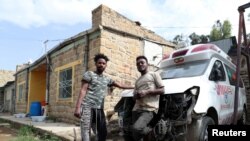The International Organization for Migration rejects allegations that it is complicit in the forcible return of Eritrean refugees being held in one of its transit centers in the Ethiopian capital, Addis Ababa.
Media reports have said the International Organization for Migration is holding Eritrean refugees in one of its three transit centers in Addis Ababa. Recent news reports also accuse the agency of busing the refugees to an unknown destination.
IOM spokeswoman, Safa Msehli calls these charges patently untrue. She tells VOA that IOM’s transit center was taken over by the Ethiopian government’s Agency for Refugee and Returnee Affairs earlier this month.
“IOM would like to clarify that the management of the center is effectively under the control of the government since the third of December," said Msehli. "IOM does not hold people anywhere in the world against their will, nor does it engage in forced return.”
Msehli says the three transit centers IOM has been running in Addis Ababa for many years are there to assist stranded migrants, returnees and people on the move who need temporary accommodation.
“The government has requested IOM support to temporarily accommodate a number of vulnerable refugees that were stranded in Addis Ababa while they reviewed their individual out-of-camp options as per the government’s out-of-camp policy," said Msehli. "… Until now, the center remains under the control of the government. IOM does not have any activities, nor any control or authority over it.”
In a statement Friday, Ethiopia’s government said it was safely returning Eritrean refugees to the camps they had fled in the northern region of Tigray, where a battle has been raging since November 4 between government troops and the Tigray People’s Liberation Front.
The U.N. refugee agency manages four camps in Tigray sheltering some 96,000 Eritrean refugees. It reports many refugees have fled the camps seeking safety from the fighting.
U.N. High Commissioner for Refugees Filippo Grandi has expressed alarm about the safety and well-being of the refugees. In a statement, he said his agency had received numerous disturbing reports of Eritreans in Tigray being killed, abducted and forcibly returned to their home country.
If confirmed, he said, these actions would constitute a major violation of international law.





